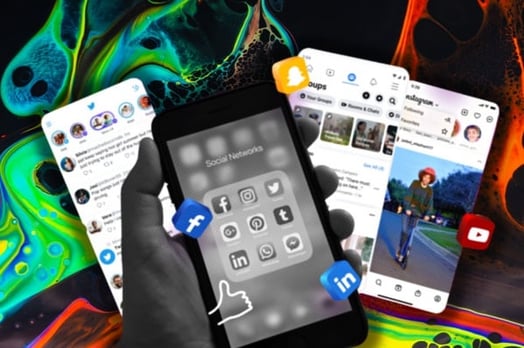We know by now that social media and artificial intelligence are changing the way people search for and find information online, but we don't yet know exactly how those changes will play out.

According to a HubSpot survey of more than 600 adults, 31% of consumers use social media when searching for answers to questions online and one in four ages 18-54 prefer social to search engines.
And the numbers for social media users tell an even stronger story: 57% use the search function on social apps, jumping to 79% for Gen Z and millennials.
Social media marketers are ready, with 87% saying consumers will search for brands more on social than through search engines in 2023, but all marketers will need updated SEO strategies to keep up with changing trends.
I think you're going to need specialty in places like search because the internet is unbundling, HubSpot CMO Kipp Bodnar said in a recent episode of Marketing Against the Grain. Specialization of marketing is going to look different in the next 10 years than the last 10.
Bodnar explains that while historically a marketer's job was to create informational content about a branded product, the future will instead require marketers to build apps and experiences based on use cases.
For example: A company selling basketballs would traditionally create content about how to play basketball, how to improve your shot, etc. Now that AI has democratized learning, that information is extremely easy for users to find.
In the future of search, a basketball company will instead need to focus on use cases: youth basketball leagues, for example. Instead of simply publishing blog content, marketers would build an app for youth basketball leagues and then recommend basketballs to its users in a more personalized way via that app.
And apps will likely continue to be important in a mobile-first world where 57% of consumers reported using their phones over any other device when looking up a question on a search engine (a number which rose to 80% for Gen Z).
To meet the needs of the consumer, Bodnar says that marketers will need to become more entrepreneurial, conceptualizing and building applications as needed to market products. This might lead to a future where brands have a multitude of micro applications to more effectively market their products.
In the same episode of Marketing Against the Grain, Kieran Flanagan, CMO at Zapier, predicts three waves of AI and search:
-
AI that has not been optimized for search, such as GPT-3
-
AI that is built for search but not entirely accurate or reliable, such as ChatGPT and Bard
-
AI built into traditional search that optimizes current search models using new tech
This new reality is still a ways off, with 86% of consumers still finding traditional search engines effective, compared to 53% for social search and 35% for AI chatbots like ChatGPT so marketers have time to adapt to changing consumer preferences.
In the meantime, marketing teams can follow consumer trends to meet their customers where they are while delivering content that resonates, whether that's on YouTube Shorts, TikTok, or through a blog post.
"Social SEO is huge because you want to make sure you're creating content that answers questions people have, but to do it in an entertaining way," says Kami Watson Huyse, CEO of digital marketing agency Zoetica. AI tools can churn out content, so it has to capture people's imaginations and their emotional states.
That human-first content will likely be key as it becomes impossible to keep up with the sheer speed of artificial intelligence.
While consumers continue to shift toward social- and mobile-first search tendencies, and AI grows smarter, marketers should put on their entrepreneurial hats and imagine creative, innovative solutions to reach their customers in the future.
"Search engine in an AI world is going to look very similar to search engine optimization in a pre-AI world, but search is going to be way more fragmented; it's not going to just be about Google," says Bodnar. "YouTube, TikTok, Reddit, all of these other sources of data are going to become a meaningfully important search engine in their own right."
For a deep dive into new data on all things SEO, check out this analysis.
What did you think of this article?
Seo
.jpg?width=48&height=48&name=IMG_2563%20(1).jpg)